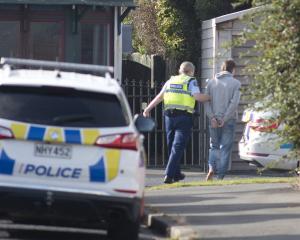The claims came from Dunedin South Labour MP Clare Curran yesterday, after the Dunedin City Council released a summary debriefing on the handling of the June 3 event.
The document identified communications breakdowns and organisational inadequacies that left some involved in the response feeling like the city dodged a bullet.
''We were lucky,'' Clutha-Taieri area response manager Senior Sergeant Alastair Dickie declared in the document.
The faults included closing the council's customer services agency at 5pm on the day of the flooding, leaving worried residents' calls to be diverted to an after-hours service.
That was reversed an hour later, but was followed by the deactivation of the emergency operations centre (EOC) - from which the flooding response was co-ordinated - before midnight.
Ms Curran told the Otago Daily Times the debriefing showed the city was ill-prepared, and called for an independent audit of Civil Defence preparedness in Dunedin.
''The Civil Defence response can best be described as asleep on the job that night,'' she said.
Dunedin Mayor Dave Cull could not be contacted, but DCC civil defence and rural fires manager Neil Brown said Ms Curran was ''wrong''.
While the EOC had closed ''through lack of need'' on the night, as affected residents ''hunkered down'' until morning, ''that doesn't mean that nothing was happening'', he said.
Emergency services remained on the streets all night, as he had, Mr Brown said.
The findings came as no surprise, as communication, in particular, could be problematic during major events.
The debriefing had also identified many areas in which the response worked well, but ''we can always do better''.
Despite that, Mr Brown rejected Ms Curran's call for an audit, saying the debriefing had been headed by Peter Cameron, of the Ministry of Civil Defence and Emergency Management, to provide ''that independent element''.
A copy of the debriefing was requested by the ODT two months ago, and released yesterday after ministry staff in Wellington considered it.
It showed police acting area commander Inspector Mel Aitken had questioned the handling of the evacuation of elderly patients from Fulton Home, saying it ''could have been done better''.
That was, in part, because several agencies and staff all thought they were responsible for the same job.
Community board representatives also complained that calls to the council went unanswered, and no updates were provided from the EOC, leaving some board members to fend for themselves.
''We now know that we are on our own and will plan and prepare for that,'' Saddle Hill Community Board chairman Scott Weatherall said.
The DCC's communications team was also found to be under-resourced while providing updates via social media, and concerns were raised that many people in South Dunedin - the worst-affected area - did not have internet access to receive them.
The decision not to declare a local Civil Defence emergency was also questioned again, but defended by Mr Brown, who maintained it was not needed.
The findings had shaped a new ''corrective action plan'', to be signed off by councillors next month, and new drills and planned training with community boards.
Ms Curran also called for an independent audit of the city's stormwater network, but a council report outlining ''significant issues'' with the network in South Dunedin would be presented to councillors next month.
Council staff would not discuss its contents in detail yesterday, but have previously said a suspected ''bottleneck'' at the Portobello Rd pumping station may have worsened flooding problems in South Dunedin.












